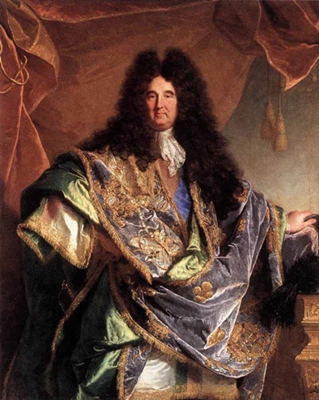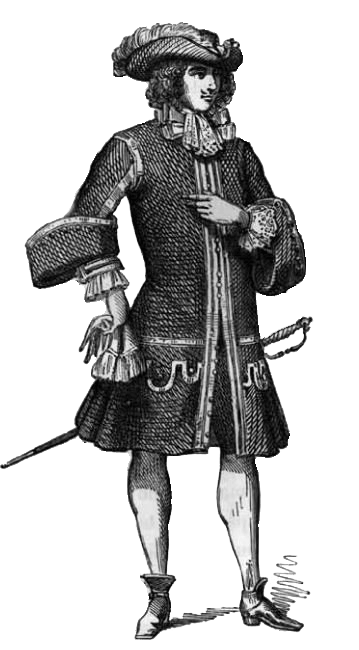Dangeau’s Diary, December 1688

11th. — Monsieur de Boulonde has returned to Huis, after having placed under contribution all the villages comprised between the mayoralties of Bolduc and Breda. He has been within two leagues of Bolduc, and was under the necessity of burning twelve or fifteen villages. He has also put under contribution the country about Liege, from which he will raise more than five hundred thousand livres.
21st. — Monsieur de Monaco has informed the King that he received, with the profoundest gratitude, the favour which his Majesty had done him, in naming him a Knight of the Order. That he entreated his Majesty would permit it to be noted in the registers, that the rank which he held in this ceremony, in which he ranks according to his duchy of Valentinois, should not prejudice the prerogatives and rank in the state which his Majesty has granted to his family, but that if his request was in the least disagreeable to his Majesty, he would accept the order unconditionally. The King was pleased with this letter, and has ordered that all that Monsieur de Monaco desired, should be inserted in the registers, in conformity to the request he had made the King in his letter.
23d. — Monsieur de Seignelay entered the King’s apartment who was still in bed, and brought him letters from Monsieur de Lauzun, who arrived on Tuesday morning at Calais, bringing with him the Queen of England and the Prince of Wales, whom the King had entrusted to him, on Sunday or Monday evening. This plan had been in agitation for a fortnight. Lord Powis, husband of the gouvernante, had secretly brought the Prince of Wales from Portsmouth to London and had hidden him in a poor-house in the suburbs, above sixty persons, whom it was impossible not to intrust, were in the secret. The King of England retired to rest with the Queen on Sunday, as usual, and made her rise an hour afterwards, to confide her to Monsieur de Lauzun, who was waiting for her at the door of the chamber. He assisted her into the coach, and they then proceeded to fetch the Prince of Wales with his nurse and rocker. They had relays of horses as far as beyond Gravesend, where they embarked on board a yatcht belonging to Monsieur de Lauzun, the captain did not know who his passengers were, and even Monsieur de Lauzun, who had with him an Englishman to explain the commands issued by the captain of the yatcht, was ordered by the King of England to poniard him, in case he should wish to make any manoeuvres contrary to their intention, of landing at Calais or at some other French port. Saint Victor, who had all along been in the secret, had followed the coach, alone upon horseback. Lord Powis and his lady had preceded them and joined the Queen in the yacht, in which the Queen was hidden in the hold, carrying the Prince of Wales in her arms, like a parcel of dirty linen. The child never cried, neither in the coach nor in the yacht. All was conducted in the happiest and most admirable manner. The Queen, upon arriving at Calais, would not permit any honours to be shewn her. Monsieur de Lauzun informs the King, that the King of England had commanded him not to place the Queen in any hands but his, and that it was very unfortunate he could not execute this order, not having permission to present himself before his Majesty. The King answered him with his own hand, wrote him a most condescending letter, and permits him to return to court. The King even said to his ministers during the council, “<em>He will be surprised and very glad to see my writing; for he was formerly accustomed to it.</em>” The King has sent one of his gentlemen in ordinary to the Queen of England, to congratulate her upon her safe arrival, and his Majesty will immediately send off carriages, guards, and all the necessary attendants for the service of the Queen. Vincennes is furnishing for her reception. Monsieur le Premier heads the household, as his father did before on a similar occasion, when they went to meet the late Queen of England. The King has written to Mademoiselle de Montpensier, who has returned to Paris within these few days, that he had recalled Monsieur de Lauzun to court, that she must not be hurt at it, and that he could not refuse himself the pleasure of seeing a man who had so successfully performed so important an action.
25th. — A naval officer has just arrived with the intelligence, that on Monday or Tuesday night, the King of England, disguised, and with only one follower, quitted London. His design is to escape to France, and to cross the sea in a small vessel commanded by the mayor of Boulogne, but it is feared that he has been taken on the road by the common people, who are all for the Prince of Orange. The Queen of England comes from Calais to Boulogne, where she will await intelligence of her husband, resolved, as she says, if he is arrested, to pass over again into England to suffer martyrdom with him.
28th. — News from England has arrived that the King has been arrested at Faversham, and conducted prisoner to Rochester; that he was not recognised at first, but was seized because being found within two leagues of the sea, he was taken for a catholic, anxious to make his escape. He was disguised as the valet of a nobleman who was also arrested. The jailer of Rochester is said to have recognised the King when in prison.
30th. — After his <em>levee</em>, the King held a chapter of the order. The chancellor, Monsieur de Louvois, rendered him an account of all the testimonials of the knights. His Majesty then made us enter his closet, and dubbed us all knights of Saint Michael, without observing any rank, just as we came to his hands. He even missed some, such as the Ducs d’Estrees, d’Uzes and de la Feuillade, whom he dubbed in the evening. The ceremony is performed in this manner: the King draws his sword, the intended knight kneels down, and the King strikes him upon both his shoulders with it, saying to him: “<em>In the name of Saint George and Saint Michael, I make you a knight.</em>” Previous to the ceremony, the King told us, that he had seen, by the testimonials of our nobility, good life, and morals, that there was no obstacle to our receiving a favour which he was very happy to confer upon us. There was so little rank observed upon this occasion, that the Duc de Beauvilliers and myself were the first and Monsieur Le Grand followed us.


